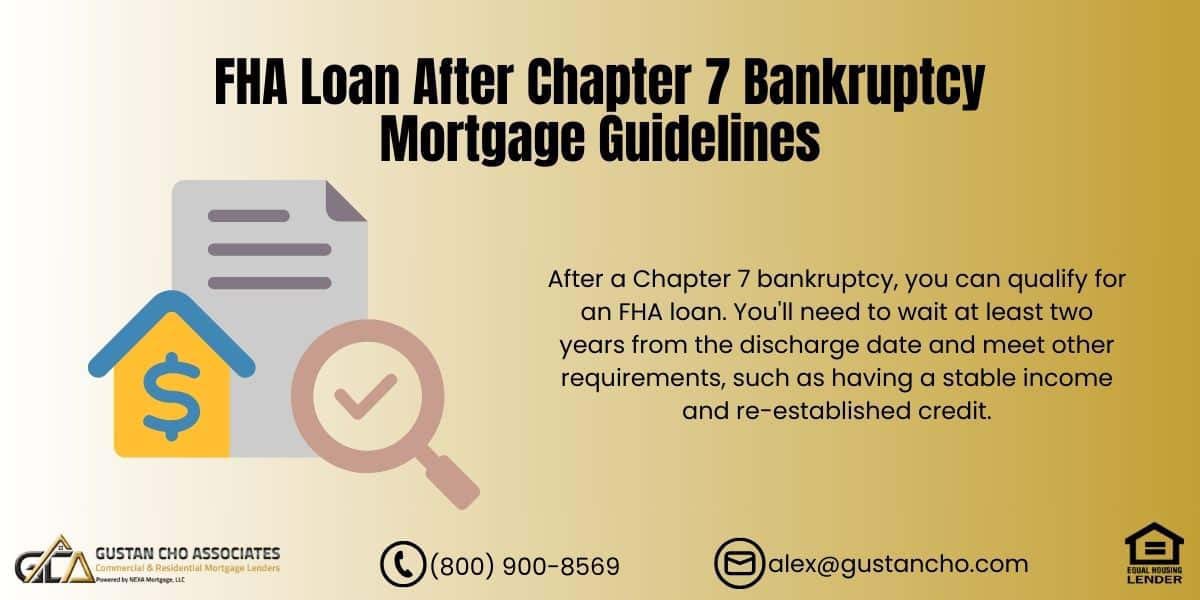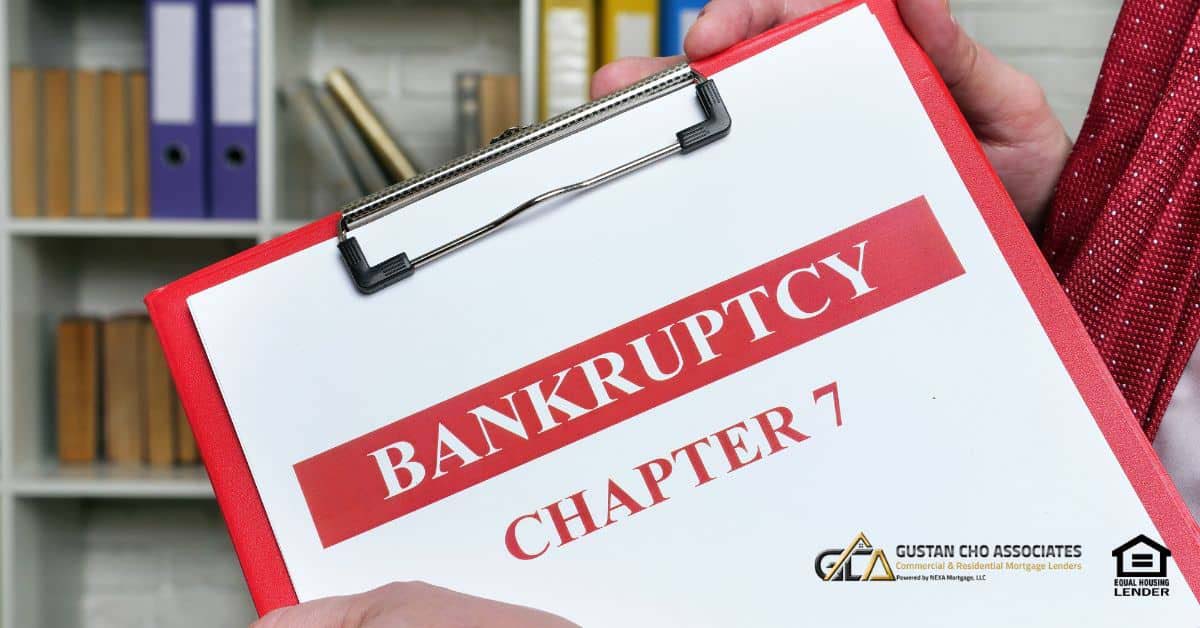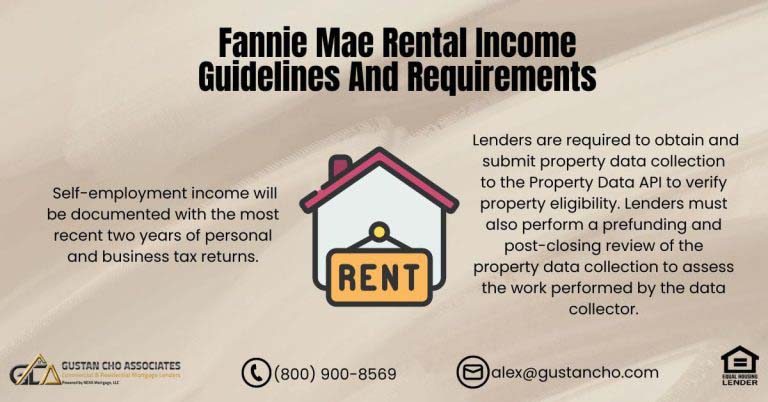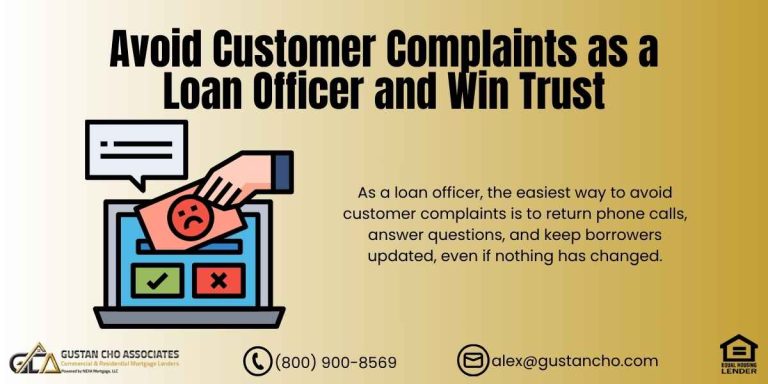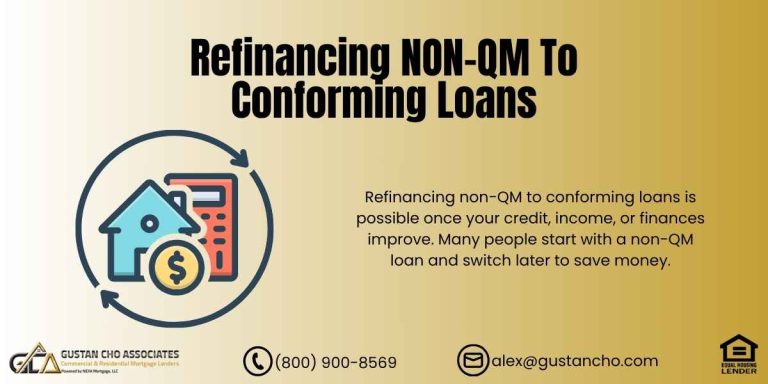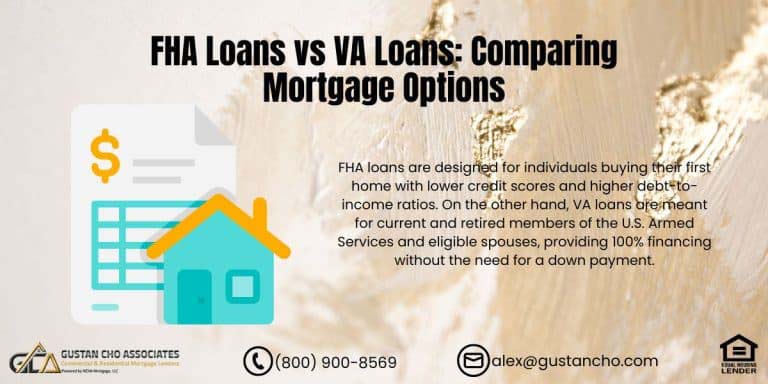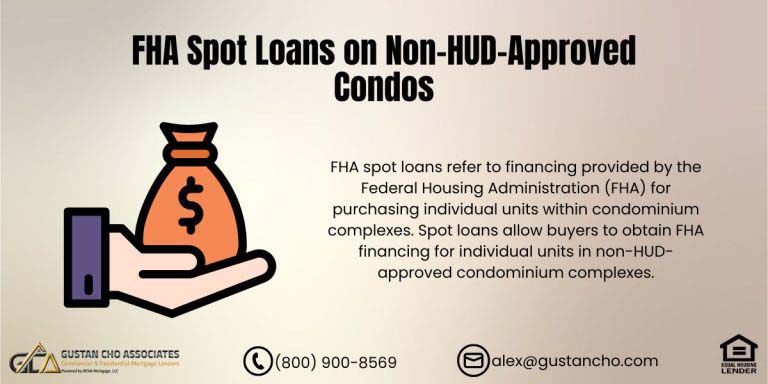Qualifying for home loans can often be tough, especially if you’re bouncing back from a Chapter 7 bankruptcy. But here’s some good news! Securing an FHA loan after a Chapter 7 bankruptcy is definitely within reach. Provided, it’s been two years following your bankruptcy discharge. This blog post is all about unraveling the latest steps, necessary qualifications, and valuable tips. We want to help elevate your chances of being approved for an FHA loan after Chapter 7 bankruptcy in 2024. We want to make sure you feel equipped and confident as you step forward to homeownership.
What We’ll Cover:
- HUD Guidelines on FHA Loans After Bankruptcy
- Importance of Re-establishing Credit
- Rebuilding Credit with Secured Cards
- Eligibility Requirements for FHA Loans After Bankruptcy
- The FHA Loan Application Process
- Tips for Preparing for an FHA Loan
- Common Challenges and Solutions
HUD Guidelines on FHA Loans After Bankruptcy
Government loans and Conventional loans have different mortgage guidelines on qualifying for a mortgage on Chapter 13 Bankruptcy Versus Chapter 7 Bankruptcy. When you’ve gone through a Chapter 7 bankruptcy and are considering reentering the housing market, it’s important to know the rules for getting an FHA loan after Chapter 7 bankruptcy. This was explained by the U.S. Department of Housing and Urban Development (HUD). Here’s a simple breakdown of what you need to keep in mind:
Waiting Period
First, you must take your time with it. You’ll need to wait for at least two years from the date your Chapter 7 bankruptcy was officially discharged before you can be considered for an FHA loan. This waiting period is crucial for showing you’re back on your feet financially.
Credit Score Requirements
To be eligible for a lower down payment of only 3.5%, your credit score must be at least 580. If it’s still under that, don’t lose hope. You might still qualify, but you’d be looking at needing to put down a larger down payment of 10%.
No Late Payments
After your bankruptcy has been discharged, it’s really important that you keep your nose clean in terms of payments. That means no late payments at all. Lenders want to see that you’ve gotten into good financial habits before they again trust you with a loan. One or two late payments are not a deal killer as long as the borrower gets an approve/eligible per Automated Underwriting System Approval.
These guidelines ensure that if you’re getting an FHA loan after a Chapter 7 bankruptcy, you’re ready for the responsibility of a mortgage.
FHA Loan After Chapter 7 Bankruptcy? It’s Possible—Let Us Help You Qualify!
Contact us today to find out how we can help you secure a mortgage and buy your home.
Importance of Re-establishing Credit After Bankruptcy
The real estate and credit meltdown of 2008 has affected millions of Americans throughout the United States. Millions of hard-working Americans have lost their jobs and businesses. Others have lost their homes and had to settle for minimum wage jobs. Bankruptcy and foreclosure rates have soared to historical highs.
Millions of Americans who lost their jobs or businesses were living off their credit cards and other credit and they eventually could not pay the debts they incurred. Those who could afford to file bankruptcy did so while others did not have attorney fees to file bankruptcy and just dodged bill collectors.
After going through something as challenging as a Chapter 7 bankruptcy, getting your credit back on track is super important. It’s like showing those banks and lenders that, yes, you hit a rough patch, but you’re back and ready to handle money smartly. Here’s a friendly guide on how to pick yourself up and rebuild your credit the right way:
- Start with Secured Credit Cards: Think of secured credit cards as your best buddy in your journey to rebuild credit. They work differently because you put down a security deposit, which limits your credit. It’s a safer way to show you can be trusted with credit again.
- Always Pay Bills on Time: This one’s a no-brainer but super important. Paying every bill right when it’s due helps keep your credit score from dipping. It’s like proving you’re reliable, one payment at a time.
- Keep Your Spending in Check: It’s tempting to go crazy about spending. Try to keep the balance on your credit cards under 30% of what you’re allowed to spend. It shows you’re responsible and smart about not maxing out your credit.
And, for folks who’ve been through Chapter 7 and are thinking about owning a home again, looking into an FHA loan after Chapter 7 bankruptcy could be a good move. But getting a loan for a new home after going through bankruptcy is possible. It’s all about taking the right steps to show you’ve got your financial habits in a good place.
Rebuilding Credit with Secured Cards
Secured credit cards can be a game-changer when you’re looking to boost your credit score. Especially if you’re considering applying for an FHA loan after Chapter 7 bankruptcy. Here’s a straightforward guide to getting the most out of these cards:
- Start by Getting 3-5 Secured Cards: It might sound like a lot, but the key here is to establish several positive lines of credit. The more evidence you have of being responsible with credit, the faster your score will climb.
- Make Regular Purchases: Don’t just get those cards and let them collect dust. Use them for everyday purchases like groceries or gas. But here’s the catch – buy only what you can afford to pay off at month’s end. This way, you’re building credit without getting stuck in debt.
- Keep a Close Eye on Your Credit Score: Keeping an eye on your credit score is very important. When bouncing back from something significant as a Chapter 7 Bankruptcy and eyeing opportunities like an FHA loan, your credit score plays an important part. You can keep track of your credit score at no cost by enrolling in a credit monitoring service like Credit Karma. This isn’t just about watching your score go up, though that’s pretty rewarding, too. It’s also about making sure no inaccuracies are dragging your score down without you knowing.
This approach is about taking proactive steps to rebuild or strengthen your credit. This makes opportunities like securing an FHA loan after a Chapter 7 bankruptcy more accessible. It’s about playing it smart with your finances and making every effort count.
Eligibility Requirements for FHA Loans After Bankruptcy
You must meet certain requirements to be eligible for an FHA loan after filing for Chapter 7 bankruptcy. First and foremost, having a stable job or a consistent source of income is crucial. This is so you can comfortably manage the monthly mortgage payments without stress. Secondly, when it comes to your debt-to-income ratio, which is a fancy way of saying the amount of debt you have compared to your income, it’s best if it’s under 43%.
However, some lenders might be more flexible and allow a higher ratio. Lastly, rebuilding your credit is key. Starting anew with secured credit cards or other methods to build back your credit shows lenders that you’re back on the right track financially. This step is essential for securing an FHA loan after Chapter 7 bankruptcy.
What Are Compensating Factors?
Mortgage lenders consider having aged multiple credit tradelines as compensating factors. Make sure to never be late after the Chapter 7 Bankruptcy discharged date. No late payments after bankruptcy. Many lenders will not approve anyone who had any late payments after a bankruptcy and/or foreclosure. Lenders expect timely payments on all credit obligations after a bankruptcy and/or foreclosure. One late payment can be a reason for credit denial.
Going Through the FHA Loan Application Process After Declaring Chapter 7 Bankruptcy
Applying for an FHA loan after exiting Chapter 7 bankruptcy might initially seem daunting, but it’s doable with the right steps. Here’s a simple breakdown of what you need to know:
Pre-Approval
Before you start the process, you’ll want to talk to a lender who can give you a pre-approval. This basically means they’ll check your finances to see how much money they might be willing to lend you for a house. It’s like getting a heads-up on your budget.
Gathering Documents
Once you know your budget, it’s time to dig up all those important papers you’ve probably got filed somewhere. You know the drill: your tax returns from the last couple of years, recent pay stubs to prove your income and bank statements. These documents help the lender see that you’re good for the loan.
House Hunting Time
Here’s the fun part—looking for your new home within your budget. Working with a real estate agent here is always a good idea. They know the ins and outs of the market and can help you find a place that fits what you’re looking for.
Submitting Your Loan Application
After finding a house you love, you’ll complete a more detailed loan application. This is where you officially ask for the money from the lender. You’ll attach all those documents you gathered earlier to show them you’re a trustworthy borrower.
The Underwriting Stage
Now, the lender will examine everything you’ve submitted, double-check your information, and assess how risky it is to lend you the money. This is basically their way of making sure everything checks out before they give you the green light.
Closing Time
This is the final hurdle. If the lender is happy with everything and approves your FHA loan after Chapter 7 bankruptcy, you’re on to closing. This is when you’ll sign all the official papers, handle any last-minute details, and—the best part—get the keys to your new place.
And that’s it! Applying for an FHA loan after Chapter 7 bankruptcy might seem overwhelming, but breaking it down step-by-step makes the journey more manageable and less intimidating.
Looking to Buy a Home After Chapter 7 Bankruptcy? FHA Loans Can Make It Possible!
Contact us today to understand how we can help you navigate the process and get approved.
Tips for Getting Ready for an FHA Loan After Chapter 7 Bankruptcy
If you’re looking to apply for an FHA loan after a Chapter 7 bankruptcy, here are a few handy tips to help you get prepared:
- Start Saving for a Down Payment: Begin by putting aside at least 3.5% of the home’s price. This will be your down payment. Starting to save as early as possible makes a difference, as every small amount counts.
- Keep an Eye on Your Credit Report: Remember to review your credit report frequently. This way, you can quickly spot any mistakes. If you find something wrong, don’t hesitate to challenge it. Cleaning up your credit report can go a long way in making your loan application smoother.
- Create an Emergency Fund: Life is full of surprises, and not all are pleasant. Building up a little nest egg for emergencies gives you a financial cushion and shows lenders you’re responsible with money. Plus, having some extra cash on hand for those unforeseen expenses is always good.
Following these tips can help you get an FHA loan after a Chapter 7 bankruptcy.
Common Challenges and Solutions
Securing an FHA loan after a Chapter 7 bankruptcy can seem like a tough journey. But it’s possible with the right strategies. Here’s a breakdown of common hurdles and practical tips to tackle them:
If your credit score took a hit: It’s common to see your credit score drop after bankruptcy. To improve it, start using secured credit cards wisely. Make sure to pay your bills on time, every time. This shows lenders you’re managing your finances responsibly now.
When your debt-to-income ratio is high: Lenders look at this ratio to determine your ability to manage monthly payments and repay debts. If your score is high, concentrate on settling any current debts. Also, avoid taking on new debts, especially before applying for an FHA loan after a Chapter 7 bankruptcy. This can improve your chances of approval.
Struggling with saving for a down payment: It’s not uncommon to find yourself short on funds for a down payment after a financial setback like bankruptcy. Look into down payment assistance programs. There are plenty out there designed to help. Alternatively, if you have generous family members, they might be able to gift you the down payment.
Securing an FHA loan post-bankruptcy becomes more achievable by focusing on rebuilding your credit. Keep your debt-to-income ratio low and find solutions for your down payment. Remember, it’s about taking those small, essential steps towards your financial recovery.
Ready to Own a Home After Chapter 7 Bankruptcy? Let’s Get You Approved for an FHA Loan!
Reach out now to see how you can qualify and start your journey to homeownership.
John’s Journey to Buying a House After Bankruptcy
In 2020, John had to file for Chapter 7 bankruptcy, which wiped out his debts and gave him a new beginning. He had a goal in his mind: to own a house. Knowing that it wasn’t going to be easy, especially after going through bankruptcy, John laid out a plan and followed these crucial steps:
1. Building Credit Again: Right after his bankruptcy was settled, John decided to rebuild his credit. He went ahead and got himself three secured credit cards. The key here was using them wisely—buying only what he needed and paying the bills on time, every time.
2. Saving Up for the Down Payment: John put a bit of his paycheck aside in a monthly savings account, specifically for the house’s down payment. He was aiming for a 3.5% down payment, often the minimum required for FHA loans, especially helpful for someone looking for an FHA loan after Chapter 7 bankruptcy.
3. Keeping His Job Stable: John knew that having a steady income would be crucial when applying for a mortgage. So, he focused on keeping his job and ensuring a stable income, showcasing his financial responsibility and ability to pay back what he owes consistently.
4. Staying on Top of Payments: John was meticulous about paying bills on time to ensure he never missed a payment again. A clean, recent payment history was essential for him, especially after bankruptcy, to demonstrate his financial turnaround.
By sticking to this plan, John significantly improved his financial standing. By 2022, his credit score had risen to 640, a great achievement considering his bankruptcy two years prior. This score put him in a good position to apply for an FHA loan after Chapter 7 bankruptcy, which he did and got pre-approved for.
<p”>Having the pre-approval, John found his dream home and went through the buying process. He successfully closed on his mortgage and achieved his dream of homeownership. This journey was a testament to John’s hard work, determination, and smart use of FHA loan guidelines, which enabled him to go from bankruptcy to becoming a happy homeowner.
FAQs: FHA Loan After Chapter 7 Bankruptcy Mortgage Guidelines
- 1. Can I get an FHA loan after Chapter 7 bankruptcy? After a Chapter 7 bankruptcy, you can qualify for an FHA loan. You’ll need to wait at least two years from the discharge date and meet other requirements, such as having a stable income and re-established credit.
- 2. What are the credit score requirements for an FHA loan after Chapter 7 bankruptcy? After going through Chapter 7 bankruptcy, in order to qualify for an FHA loan, you’ll need a minimum credit score of 580. If your score is lower, you may still be eligible, but a 10% down payment will then be required.
- 3. How can I rebuild my credit after Chapter 7 bankruptcy to qualify for an FHA loan? Rebuild your credit by getting secured credit cards, paying your bills on time, and keeping your credit card balances low. This helps show lenders that you can manage credit responsibly.
- 4. What documents do I need to apply for an FHA loan after Chapter 7 bankruptcy? When you apply for an FHA loan after Chapter 7 bankruptcy, you must provide tax returns, bank statements, pay stubs, and other financial documents. These documents confirm your income and financial stability.
- 5. Is there a waiting period before I can apply for an FHA loan after Chapter 7 bankruptcy? Remember that following your Chapter 7 bankruptcy discharge, there is a required waiting period of two years before you are eligible to apply for an FHA loan.
- 6. What happens if I have late payments after my Chapter 7 bankruptcy discharge? Having late payments after your Chapter 7 bankruptcy discharge can hurt your chances of getting an FHA loan. It’s important to make all payments on time to show lenders you are financially responsible.
- 7. How much down payment do I need for an FHA loan after Chapter 7 bankruptcy? You need a minimum down payment of 3.5% if your credit score is at least 580. If your score is lower, you might need a down payment of 10% to qualify for an FHA loan after Chapter 7 bankruptcy.
- 8. Can I qualify for an FHA loan while I am still in a Chapter 13 repayment plan? Sure, you can qualify for an FHA loan while in a Chapter 13 repayment plan if you have made 12 on-time payments and have trustee approval. The loan will need to go through manual underwriting.
- 9. What are compensating factors, and how do they help in getting an FHA loan after Chapter 7 bankruptcy? Positive financial behaviors, like having multiple aged credit lines, can increase your chances of getting approved for an FHA loan after Chapter 7 bankruptcy.
- 10. Why is it important to re-establish credit after Chapter 7 bankruptcy? Re-establishing credit after Chapter 7 bankruptcy is crucial because it shows lenders that you have recovered financially and can manage credit responsibly. This improves your chances of qualifying for an FHA loan after Chapter 7 bankruptcy.
Related> Mortgage After Chapter 13 Bankruptcy
Related> Mortgage Part Of Bankruptcy
Related> Qualifying For Mortgage After Bankruptcy And Foreclosure
If you have any questions about FHA loan after Chapter 7 bankruptcy, please contact us at 800-900-8569. Text us for a faster response. Or email us at alex@gustancho.com. The team at Gustan Cho Associates is available 7 days a week, on evenings, weekends, and holidays.
This blog about FHA Loan After Chapter 7 Bankruptcy Mortgage Guidelines was updated on August 5th, 2024.
Had a Chapter 7 Bankruptcy? You Can Still Qualify for an FHA Loan!
Contact us today to learn how you can qualify for an FHA loan and get back on track to owning your home.


